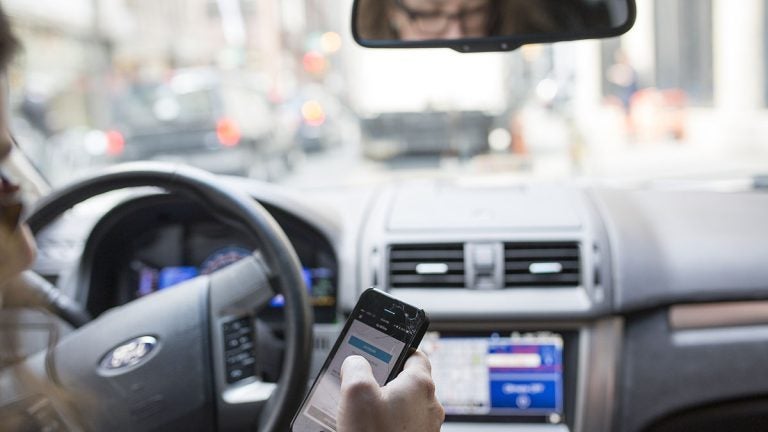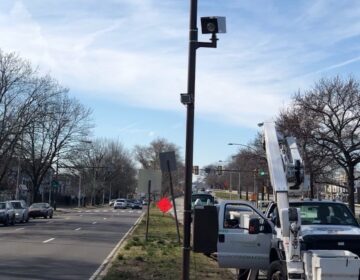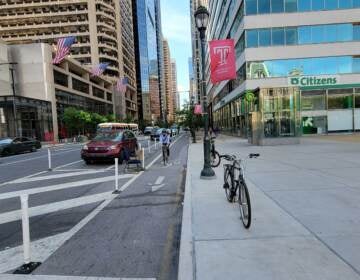Philly parking czar wants to know who’s driving your Uber, says Pa. audit doesn’t go far enough
PPA director Scott Petri wants the authority to certify Uber and Lyft drivers as part of wide-ranging regulatory package aimed at making ride-hailing services safer.

Philadelphia Uber driver consults her phone during a shift. (Jessica Kourkounis for WHYY)
This article originally appeared on PlanPhilly.
—
The head of Philadelphia’s parking agency said he agrees with a state audit calling for better safety measures for Uber passengers, but he said legislators should go much further and impose wide-ranging new regulations on ride-hailing services.
Scott Petri, executive director of the Philadelphia Parking Authority, wants the state to grant the PPA power to certify Uber and Lyft drivers in the city — and to conduct background checks before they can take passengers. The companies now conduct the checks themselves and do not have to share data on drivers with the PPA.
“We should pattern ourselves after what we call the ‘New York model,’ which would require the transportation network company (known as TNC) drivers to be certificated by the Philadelphia Parking Authority. That means we know who the drivers really are, and there’s a list. If there’s a complaint, we can determine that they are a TNC driver and which company they work for,” Petri said in an interview Tuesday.
New York City has some of the most stringent ride-sharing rules in the country. The city licenses and fingerprints drivers; last year, lawmakers capped the number of licenses and set a minimum wage for drivers.
With far less regulation, Philadelphia counts at least 20,000 ride-sharing cars on its streets, providing an estimated 125,000 rides a day, Petri said. In the 12-month period that ended in June, the parking agency received 38 complaints, most of them involving fare disputes but a few related to driver conduct. It issued 199 citations to drivers during that period related to expired inspection stickers, incorrect signage and other regulatory matters. But those numbers don’t capture the full scope of complaints because ride companies don’t share information with the PPA, Petri said.
Ride-hailing surge spurs safety concerns
The rise of ride-hailing services has generated a whole new crop of safety issues for passengers and the regulators trying to protect them. Drivers have been accused of assaulting and raping passengers. A New Jersey woman was allegedly murdered last month after getting into a car she mistakenly thought was an Uber she had called.
Petri endorsed a Pennsylvania Public Utility Commission audit released last week that said Uber needs to do better background checks on its drivers in the state; make it easier for passengers to report emergencies; and use cameras and other technology to gather data on crashes and other incidents.
“We agree with them 100 percent and actually would say that we should go even maybe a step further,” Petri said.
The commission oversees ride-hailing services everywhere in Pennsylvania except Philadelphia, where the PPA is nominally in charge. The parking agency receives payments of 1.4 percent of the companies’ gross receipts, with two-thirds of the funds going to the school district. The schools received $1.4 million in fiscal year 2017.
The TNC law that legalized ride-hailing in 2016 comes up for reauthorization at the end of this year. Petri is looking at that reauthorization as an opportunity to enact the regulations he proposed last year.
The most significant proposal is a new fee of 50 cents per ride meant to cover the cost of stepped-up inspections and also generate increased school district funding.
Uber did not respond to a request for comment. The company has previously opposed the new fee and argued that providing data about car trips could infringe on passenger privacy and give competitors insight into its operations.
Public Utility Commission evaluation
Unlike Petri, the PUC has not asked to take over driver screening. But auditors did raise a red flag about limitations in Uber’s Pennsylvania subsidiary’s ability to monitor real-time criminal records. Because of a state law that bars the continual sharing of arrest information with private companies, individuals charged with a serious crime could keep driving with Uber for up to a year before the company becomes aware of the incident and bars them from giving rides, the PUC said.
The PUC has urged Uber to lobby for legislation that would give it better access to new arrest information, to fingerprint drivers, and to expand the geographic areas where it monitors criminal record data.
Uber responded that it has improved its monitoring of new arrests but argued that fingerprint data is spotty, often inaccurate, and potentially discriminatory.
Uber’s phone app has a Safety Toolkit feature with an emergency button that connects a user with 911, but the PUC said the screen icon is too inconspicuous and should be made brighter, larger, and more distinctive. Uber responded that it has tested different versions of the button, in both its passenger and driver apps, and will continue refining the toolkit feature.
The PUC noted that even when Uber does receive a complaint about dangerous driving, harassment, or other safety problem, “most cases are considered to contain insufficient information … to definitively reach a conclusion.”
The PUC described a complex system Uber uses for deciding when to suspend a driver or passenger from its system, based on the type and severity of incident and the number of complaints.
The PUC asked Uber to improve its complaint management and to consider using dashboard cameras and data from smartphone recordings and accelerometers to conduct better investigations. The company said it will research dash cams, but it said their safety benefits are as yet unproven.
The PUC also urged the company to set up a system for sharing information about drivers who have been kicked off its service, to prevent them from simply switching to another ride-share company or vehicle-for-hire service.
Uber accepted the recommendation but said it raised due process, privacy and operational concerns. Sharing unsubstantiated allegations could expose the company to lawsuits, and drivers have legal rights to control distribution of their private information. The Legislature could create a system for listing banished drivers but would run into problems protecting proprietary company information, Uber said.
Among other concerns, the PUC asked Uber to speed up implementation of several safety initiatives, including features that automatically send trip information to 911 dispatchers; that detect possible crashes from smartphone accelerometer data; and that use colored lights on cars to help passengers find their rides.
WHYY is your source for fact-based, in-depth journalism and information. As a nonprofit organization, we rely on financial support from readers like you. Please give today.







